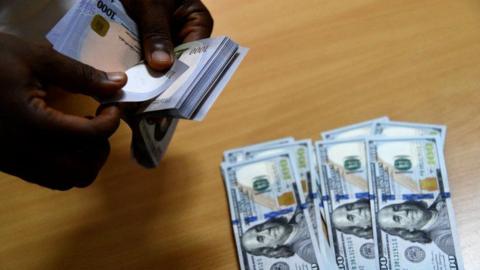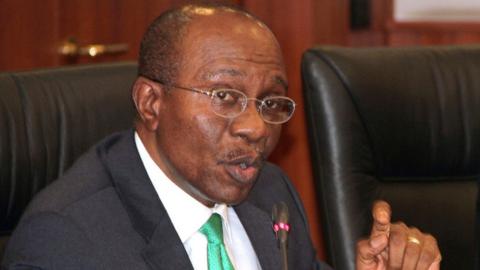CBN bans dollar sales to Bureau De Change operators, to sell directly to banks

The Central Bank of Nigeria has announced a ban on forex sales to Bureau De Change operators in the country instead opting to sell dollars and other foreign currencies directly to commercial banks, that will in turn sell to Nigerians.
This will make it more difficult for Nigerians to access hard currency from the black market which has typically operated with very little oversight.
Customers must now go to their bank, present proof and documentation to get approval to buy hard currency. Each transaction will have to be vetted and the CBN will determine how much dollars should be sold to Nigerians on a case-by-case basis.
CBN Governor, Godwin Emefiele, made this announcement after the Monetary Policy Committee two-day meeting in Abuja on Tuesday.
The CBN says it stops the sales of dollars to BDC operators because the parallel market has turned into a channel for financial frauds.
The apex bank also says that it will no longer be processing any new applications for Bureau De Change licence in the country.
Mr Emefiele added that now, the Weekly sales of foreign exchange by the CBN will henceforth be sold direct to commercial banks.
“We are concerned that BDC operators have allowed their operations to be used for graft,”
“In particular, we have noted with disappointment and great concern that our Bureau De Change operators have abandoned the original objective of their establishment, which is to serve retail end users who need $5,000 or less.
“Instead, they have become (illegal) wholesale dealers in foreign exchange to the tune of millions of dollars per transaction.”
He further claims, international bodies, and some embassies and donor agencies, are also involved in the illegal forex transactions that makes it difficult for foreign money to enter Nigeria.
The apex bank chief added that instead of the organisations to use the official Investors and Exporters (I&E) window, Nafex, they channel forex through the black market.
Mr Emefiele says they’ll “deal ruthlessly” with any bank that allows illegal forex dealers to use their bank and they will report international organisations that disobeys the order to their regulators.
This is not the first time that the CBN will ban sales of dollars to Bureau De Change, in 2016 the Central bank at a press conference announced a stop to sales of dollars to BDC operators but they later reversed the decision.
BDC operators react, says CBN ban on forex sales will make Dollar strong, Naira weak
Bureau De Change operators are companies with licences from the CBN to trade and change currency to the public and they’ve reacted to CBN ban on their operations.
CBN says the ban will ‘stabilize’ the Naira, yet this move is forcing some Nigerian businesses to reason how they will buy and keep plenty foreign currency like US dollars and Pounds sterling, because of fears that demand for them will rise.
Mohammed Abdullah, who is an official BDC operator agrees that demand for foreign currency in Nigeria will cause their prices to go up and Naira to go down.
“It can’t make the Naira strong… what they [CBN] did didn’t make any sense,” Abdullah told the BBC.
Like Abdullah, other BDC operators believe that the CBN ban on their businesses cannot hold for long.
“Do you know how many registered operators there are? Like 7000 and each one has like 5 staff. So all of them will now lose their jobs!” Abdullah who is based in Lagos complained.

BBC investigation reveals that the prices of Naira against foreign currencies is still unchanged after day one of the ban.
As at Wednesday 28 July, to buy $1 from BDC, you will need to drop N500 – the same amount it sells for on Tuesday when CBN announced the ban.
Another currency exchange operator Jubril Zubairu says “although the exchange rate is still unchanged, it will soon happen. In some days,” he said, Dollar will begin to go up against the naira.
Founder of finance website Nairametrics, Ugo Obi-Chukwu highlighted that the ban will reduce the of places where customers can exchange currency since now only banks remain as the official exchange place.
“BDCs that are no longer available, will automatically put more pressure on bank branches,” Obi-Chukwu told Nairametrics as he warns about the situation. He also warns that banks cannot cope with all the rush that will be coming their way unless they automate their exchange service.
Even if the CBN had the rightcorrect intentions to stabilize the Naira, this announcement that many were not expecting is likely to create panic and shock, and with all the challenges it will cause, the Naira might not survived as they hoped.
